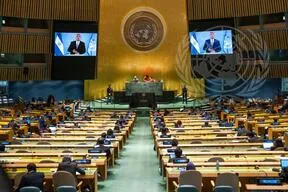Statement
Statement summary
ALBERTO FERNÁNDEZ, President of Argentina, said that with global inequality, climate change and COVID-19, the world is facing a triple pandemic. COVID-19 has demonstrated the globalization of injustice and vulnerability that goes beyond borders. Argentina welcomes patent-related proposals before the World Trade Organization to promote the local development and production of vaccines, which must be a global public good. Addressing the consequences of the pandemic must go hand-in-hand with caring for the planet, he added, emphasizing his country’s total commitment to the Paris Agreement on climate change and its determination to achieve carbon neutrality by 2050.
He called for the restructuring of the international financial architecture, saying that it is painful that a commitment to provide $100 billion to developing countries to combat climate change has yet to be realized. Climate justice will be a mere chimera without financial justice that contributes to social justice. Drawing attention to “debticide”, or homicide by debt, he called for an inclusive multilateral agreement on sovereign debt restructuring, as the Group of 20’s debt service suspension initiative, while worthwhile, does not comprehensively address the issue. The credit ratings of countries, which currently is in the hands of a few private agencies, should be part of the agenda for international financial reform. Discussion of a global minimum tax also needs to be deepened, as the proposal put forth by the Group of Seven and Group of 20 does not sufficiently favour emerging economies.
The COVID-19 crisis is also a human rights crisis, he said, emphasizing that preventing and averting serious human rights violations, crimes against humanity and genocide should be one of the United Nations main tasks. Together with France, Argentina is preparing a campaign for the universalization of the International Convention for the Protection of All Persons from Enforced Disappearance, with the aim of achieving 100 ratifications by 2025. By legalizing abortion, the Argentine State has assumed responsibility for protecting the life and health of women and persons of other gender identities capable of gestation. He also noted the adoption of legislation that would see 1 per cent of public sector jobs filled by transvestites, transsexuals and transgender people.
He reiterated his country’s request for Iran to cooperate with its judicial authorities who are investigating the 1994 attack on the headquarters of the Asociación Mutual Israelita Argentina in Buenos Aires. He welcomed the Food Systems Summit that will be held on the 23 September, adding that a transition to sustainable food production should be gradual and acknowledge that there is not single model of development that suits all the nations of the world.
He concluded by reaffirming his country’s legitimate position regarding its right of sovereignty over the Malvinas Islands*, South Georgia Islands, South Sandwich Islands and surrounding maritime areas, which are part of Argentina’s national territory, illegally occupied by the United Kingdom. There is no reason for that country not to resume bilateral talks on the Malvinas, in line with resolution 2065, adopted by the Assembly in 1965. The United Kingdom’s failure to heed the call to resume negotiations has exacerbated this dispute and its excessive military presence on the islands creates tension in a region that is meant to be a zone for peace and international cooperation. He requested the Secretary-General to renew his good offices mission in relation to this dispute.
Full statement
Read the full statement, in PDF format.
Photo

Previous sessions
Access the statements from previous sessions.
